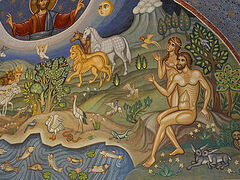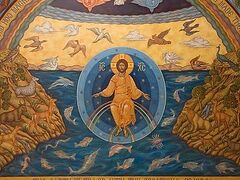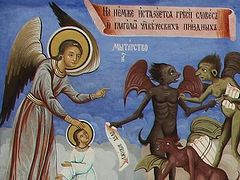 Giovanni di Paolo. The Creation of the World and the Expulsion from Paradise, 1445. Photo: wikiwand.com
Giovanni di Paolo. The Creation of the World and the Expulsion from Paradise, 1445. Photo: wikiwand.com
Accounts of Paradise in the verses of the Holy Scripture resemble the sun’s reflection in tiny dewdrops. They are negligible in size but the sun shines forth through them nonetheless.
Paradise is mentioned in the book of Genesis at the beginning of the Scripture. Paradise was established on earth but it also represented communion with Heaven, the kingdom of angels. The whole of creation represented the temple of God with Paradise as its altar and the primordial man as its priest officiating mysteries of God that we cannot grasp. Just as the altar connects the Heavenly and the earthly, Paradise in the primordial world serves as a place where Heaven meets earth and the earthly transcends to the Heavenly.
Sin cut earth off from Heaven. Paradise remained as the Kingdom of Heaven but it cannot be found on earth, so we are unlikely to uncover the mystery of Paradise here on earth. That’s why several objectives assigned to man in Paradise remain uncompleted. What kingdoms and dominions are in man’s possession today? Even a house cat doesn’t always obey him, let alone a lion. Moreover, man himself plunders nature like a wasteful tyrant.
Some of the tasks in Paradise (“be fruitful and multiply”) were completed by people in their fallen state and with all the consequences that came with it, such as fornication, unfaithfulness and abortion with complete arbitrariness. Some of the tasks will only be completed in the future when, through the power of the risen Lord, everyone will rise into a new life, when a new heaven and a new earth will amaze the risen humanity that beholds them.
In the Old Testament, there was little if any mention of Paradise after the events of the Fall. Why should we talk about what was hidden before the coming of Christ the Savior? Why give sorrow to the souls of the righteous if they already had to experience hell, just like the outcasts of Paradise? Going down into the grave mourning (Gen. 37:35), Old Testament man experienced angst and loneliness.
Paradise was mentioned in the Old Testament as a symbol of God’s blessing. It says, for example:
Grace is like a paradise in blessing. And almsgiving endures forever (Sir. 40:17).
The fear of the Lord is like a paradise of blessing. And it covers a man (if he has the fear of God.—Ed.) better than any glory (Sir. 40:27).
Any virtue preserves something of paradise. Humility, meekness, chastity, and even more so, noble love, are glimmers of Paradise in our fallen world.
The gates of Paradise were shut before the arrival of the One Who said, Verily I say unto thee, to day shalt thou be with me in paradise (Lk. 23:43). He said it to a penitent thief so that each of us, could first see ourselves as thieves and second, could say with a contrite heart:
For we receive the due reward of our deeds…Lord, remember me when thou comest into thy kingdom (Lk. 23:41-42).
The Bible says not what man will do in Heaven but how man feels without it, how awful and miserable it is to be without God, as well as how to return to God and find Paradise again. Man is a prodigal son who chose the hog’s trough over his father’s home; lies and deceit over love and warmth, along with sufferings, sorrow, and misery. Yet, the Father lovingly awaits us and the gates of His home are opened wide. Otherwise, the Old Testament temple’s curtain wouldn’t have ripped in two the moment the Savior uttered His last words, “It is finished!” Paradise, the primordial altar, is open to anyone called to the heavenly sacrament.
Hell as the opposite of Paradise
It was revealed to us that there is no place for idlers in Paradise. Hell, on the other hand, is jam-packed with idlers. How can there be any room for creative work of the spirit and personal prayer in the place of “the anguish of Hades” (Ps. 17:6) and the everlasting chains (Jude 1:6)? If you want to assess life in Paradise, you should at least have some understanding of what wretched souls endure in hell.
Exhausted by their own spiritual futility, unable to demonstrate the ability to do good, they are packed in hell like sardines: the captives of Hades suffer because of themselves, their own worthlessness. They suffer because they always sought their own during their lives, unwilling to do good for others. That’s why they are all alone, even in crowded hell, as every sufferer is separated from others by an insurmountable barrier. Separated from God and neighbor, there is neither creativity, nor work, nor any potential of knowing anything.
If Heaven is all about joy, happiness and bliss, then their opposites in hell are sorrow, torment and strangely enough, gloating. The Bible tells about an Assyrian king:
I made the nations to shake at the sound of his fall, when I cast him down to hell with them that descend into the pit: and all…shall be comforted in the nether parts of the earth (Ezek. 31:16).
The Heavens rejoice for every repentant sinner, for he is saved. The inhabitants of hell gloat over every soul carried away by the avalanche of sin to Hades. This is how those living in hell great each newly arrived minion.
Holy Scripture tells us that as soon as yet another Babylonian king descended into hell, he was immediately recognized. He was the king after all (and, what’s more, from Babylon)! Prophet Isaiah describes it this way:
Hell from beneath is moved for thee to meet thee at thy coming: it stirreth up the dead for thee, even all the chief ones of the earth; it hath raised up from their thrones all the kings of the nations. All they shall speak and say unto thee, Art thou also become weak as we? art thou become like unto us?’ (Is. 14:9-10)
These are the keywords: “become weak.” This means that hell is the kingdom of the weak and the powerless. On earth they may have seemed powerful, but everything turned to dust. They wished to rule over others, but they couldn’t rule over their passions and became slaves to their sinful desires. Therefore, it is written:
He that hath an ear, let him hear what the Spirit saith unto the churches; To him that overcometh will I give to eat of the tree of life, which is in the midst of the paradise of God. (Rev. 2:7).
Paradise is for the strong—for those who have conquered themselves, the world and the devil.
The powerless, the idlers can be with good deeds, mercy and meekness. Their weakness is pride. For whosoever exalteth himself in the world lacks the strength to humble himself, to see himself as he really is. Sooner or later, he will be abased. Anyone who exalts himself above others will be humiliated. The Prophet Isaiah adds:
Thy pomp is brought down to the grave, and the noise of thy viols: the worm is spread under thee, and the worms cover thee (Is. 14:11).
Hell is idleness and sloth, for hell is the absence of Life. Where death is king, there can be no creative activity or self-expression. Hell is boredom to death. Hell, devoid of creative energy or cognitive activity, offers nothing but fragments of memories. They pass like ghastly dreams before the gaze of the soul. Torment comes from the lack of a chance to change anything, and the lack of peace. There is only the gnashing of teeth and wailing. Despondency, terror and gloom.
Hell is an inability to show kindness, it is wasted time. If we could measure time by weight, we’d be horrified how easily we waste tons and tons of time. We waste for no reason, yet we still think we are busy.
Hell is also overcrowded. Without God, your soul is filled with emptiness, narrow-mindedness and myopia. In crowdedness, there is anguish and fatigue. Only God can offer the vastness of heaven and the lightness of freedom. Life, as a gift from God, is about infinite expanse, vastness and breadth, in the correct meaning of this word. This is what God calls man to have in eternal Paradise.
What kind of work can take us to Paradise?
 Parable of the Rich Man and Lazarus
Parable of the Rich Man and Lazarus
In the Prologue, there is a story about a monk named Athanasius who contemplated the life to come for those who labor here for the sake of salvation. In a vision, he saw how someone led him to wonderful gates too beautiful for words. Through the gates, he could observe the glow of the wondrous, ineffable life in Paradise. In fact, all he could say about the things he saw and heard were the words of the Scripture, Then shall the righteous shine forth as the sun in the kingdom of their Father (Mt. 13:43). And they shall see his face… And there shall be no night there; and they need no candle, neither light of the sun, for the Lord God giveth them light (Rev. 22:4-5). When Athanasius wished to step inside the gates to gain direct knowledge of the mystery of Paradise, he was told:
“No one who dwells in idleness enters here, but if you wish to enter, return to carry out ascetic labors, never thinking of the comforts of the world of vanity.”
Paradise is not for idlers. Paradise is a field of hard workers, who cultivate and cherish Paradise. First and foremost, they cultivate the inner fields of their souls, and only then they cultivate their surroundings.
What kind of work is this?
You deserve all possible praise for working hard throughout your life tilling, sowing, building and designing. If you drew careful plans or after thorough preparation, you conquered the vast expanses of air and space, well done! Your awards, certificates, financial rewards and public recognition are the well-deserved honors for your hard work. But, if you have done all this but never felt the need to be with God, how will you ever reach His Kingdom?
Paradise is reached by laboring on earth without laboring for earthly things. Neither the targets reached, nor the records set, nor triumphant success can save the soul. It is God’s grace accepted by a pure and contrite heart that saves. The soul that discovers God is saved, and not the proud one that furrowed the fields of life with the plow of earthly labors.
Neither social status, merits, nor visible accomplishments can pave man’s path to Paradise.
One elder was shown the Heavenly abodes, the dwelling place of those who were saved. Lo and behold, he saw a certain man in extraordinary glory who told him, “I labored for a wicked man who tormented me incessantly, withholding my wages, but I endured it to the end without grumbling.” Next, the elder saw another man who told his story, “I was a leper, but bore my serious illness with gratitude to God.” Finally, the elder saw a third man, not as honored as the first two, but still a partaker of God’s glory. He shared his story: “I was a monk for a long time and labored unceasingly for the salvation of my soul, and I was made a bishop afterward.” The blessedness of Paradise is revealed in such unexpected ways—it depends on men’s spiritual qualities rather than their worldly accomplishments. It is pretty much the same when God awards heavenly crowns according to measures and criteria unlike any that we know.
It is true that when we bid farewell to our bodies, each one of us will experience surprise. What previously seemed interesting and important all of a sudden will come across as totally irrelevant. What was dull and boring before will unexpectedly be revealed as of the utmost importance and incredibly appealing. Those who were positive about their place in Paradise will be amazed at the defeat of their self-assuredness. On the other hand, those who believed that all they deserved was hell but took time to repent and humble themselves, will be surprised to discover that the gates of Mercy have unexpectedly opened wide for them.
(To be continued)





